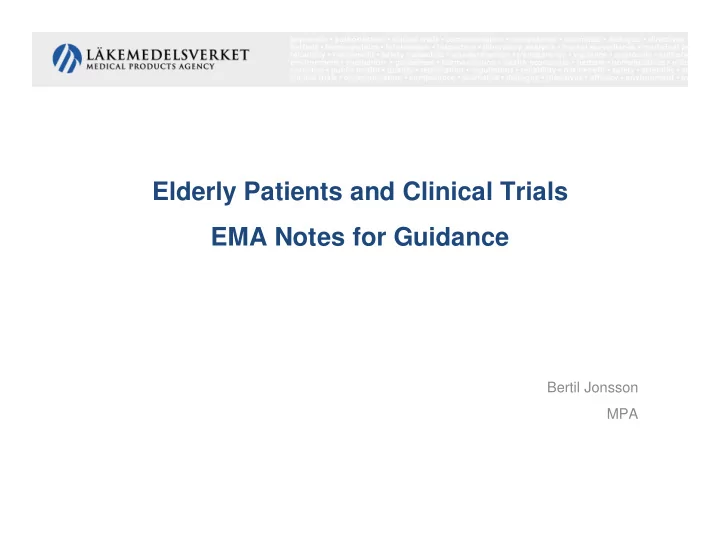

Elderly Patients and Clinical Trials EMA Notes for Guidance Bertil Jonsson MPA
"Selection bias" is always there • It is not the protocol • It is the clinician! • Or? • If not "cancer", why not "heart failure" • About 80% of cases >65 years of age
Upper age limit 65 to 95 years, median 80 years. 28.2% in the period 2002-2006 (n = 149) 21.6% in the period 2007-2008 (n = 102) Sponsor Public institutions 21/59 [35.6%] Private entities 5/36 [13.9%] Trials w. Medicinal Products by Region European Union 16/33 United States 3/37 Cherubini, A. et al. Arch Intern Med 2011;171:550-556.
Guidance Documents Elderly • Cardiac Failure 2000 – Not discussed General guidelines • ICH topic E7 1994 • Questions and Answers E7 2010 • Guidance Consistency Group – "Refer to proper NfG" instead, as this is not unique to X – Probably not for "heart failure" and "elderly"
Q and A E7 • Why? • "Representative" • Or at least "informative" (E7 n >100) • Restrictions to be avoided • "Frail" patients randomly distributed • Specific safety data to look for (cognition, falls, …) • PK
Anti-cancer NfG • Elderly and frail patients (2005) • In many indications elderly patients represent the majority of the patient population. • If not reasonably reflected in the data base, this should be justified. • Some compounds may be specifically suitable for the treatment of elderly, e.g. due to PK properties such as low sensitivity to impaired organ function. In these cases, dedicated studies in the elderly are encouraged. It is acknowledged that it may be hard to identify appropriate reference therapies in some of these cases and that other outcome measures than PFS/OS might become more relevant. In these cases it is advisable to seek regulatory agreement on the development program. • Frail patients, whether elderly or not, with clearly impaired PS constitute a vulnerable group of patients rarely included in conventional confirmatory studies. Clinical studies in this group of patients are encouraged from a regulatory perspective.
Registration Trials Cancer 1995 – 2002 (US) (JCO 2004)
Registration Trials pts >65 years of age (JCO 2004) Use in clinical practice (JCO 2010)
The Clinician as Gatekeeper? the FOCUS trial (MRC) • Advanced Colorectal Cancer • Permissive incl. criteria • Median age 64 years in the trial • Median age at death of CRC in the community 77 • 59 participating and responding oncologists • Enrolled 422 pts in the FOCUS trial • In parallel, 715 pts treated with chemotherapy off-trial • Lancet 2011, FOCUS2 trial
Prior to First Registration Trial • Limited PK data – impaired liver/kidney function, PK interaction, food interaction, .. • Limited tolerability and toxicity data – diarrhoea, dehydration, renal toxicity, cardiovascular toxicity, co-morbidity .. • Limited activity and efficacy data • Clinician as gatekeeper to protect the patient and the study • But further confirmatory studies in other indication ?
Including elderly and frail patients • Risk to the patient • Dose adjustments and supportive measures – Learning curve – Start with otherwise healthy patients • Diluting the treatment effect • Risk to the study • Need for Risk Reduction
Risk Reduction • Gain experience in otherwise healthy patients • Reasonable data base: tolerability, toxicity, efficacy, PK, co-morbidity interaction, etc. • Stratified enrolment – Primary efficacy/safety population: "Patients normally enrolled in clinical trials" – Secondary safety/efficacy population: Those excluded but normally treated in clinical practice • consider e.g. lower starting dose with dose escalation (maximum tolerated dose drugs)
Incentives • Studies specifically designed for the frail and elderly • Has been done in lung cancer (vinorelbine) • Recently in colorectal cancer (FOCUS2) • AML and the elderly? (advice procedures) • Data protection +1 year? • ?
Summary • It is not about the Protocols • It is not about the Notes for Guidance • It is about the clinician as gatekeeper – protecting the patients – protecting the trials • There is a need for risk reduction for patients and trials • There is a need for incentives
Recommend
More recommend